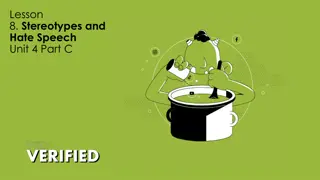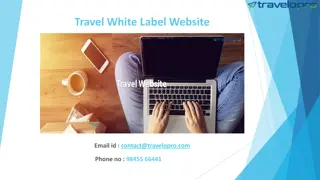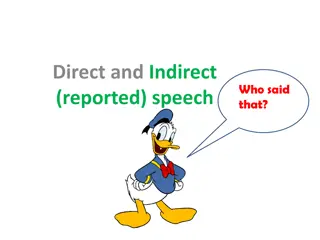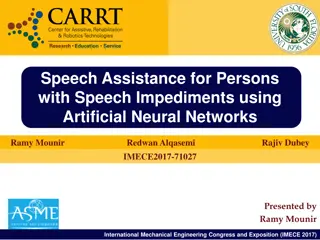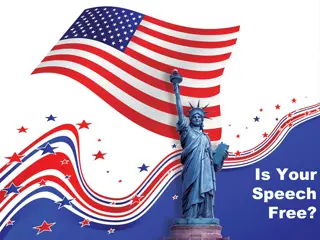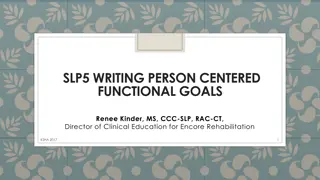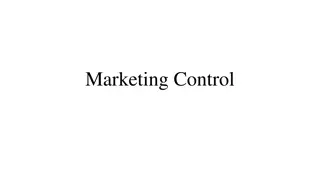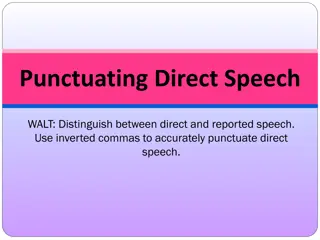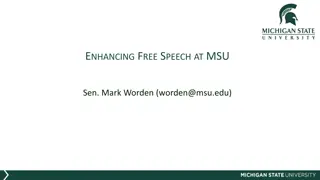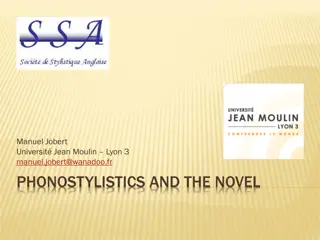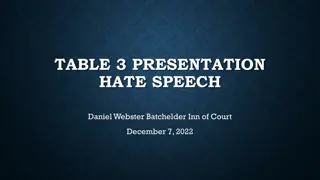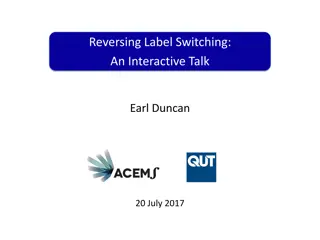Off-Label Marketing and Free Speech in the Post Caronia and Amarin World
Background of off-label use and prohibition, First Amendment challenges to FDA authority, next steps for industry and FDA in responding to the new legal landscape. FD&C Act prohibits misleading labeling, FDA's regulatory authority on drug and device promotions, FDA's view on off-label promotion prohibition. Manufacturers are prohibited from promoting products for unapproved uses, while actual off-label use is legal. Compliance with labeling requirements is crucial to avoid misbranding and adulteration.
Download Presentation

Please find below an Image/Link to download the presentation.
The content on the website is provided AS IS for your information and personal use only. It may not be sold, licensed, or shared on other websites without obtaining consent from the author.If you encounter any issues during the download, it is possible that the publisher has removed the file from their server.
You are allowed to download the files provided on this website for personal or commercial use, subject to the condition that they are used lawfully. All files are the property of their respective owners.
The content on the website is provided AS IS for your information and personal use only. It may not be sold, licensed, or shared on other websites without obtaining consent from the author.
E N D
Presentation Transcript
OFF LABEL MARKETING AND FREE SPEECH IN THE POST CARONIA AND AMARIN WORLD Habib Nasrullah, Esq., Partner Wheeler Trigg O Donnell, LLP Stephen C. Matthews, Esq., Principal Porzio, Bromberg & Newman, P.C.
TOPICS FOR TODAY Background of Off-Label Use and Prohibition First Amendment Challenges to FDA Authority to Prohibit Off-Label Promotion Next Steps for Industry and FDA in Responding to the New Legal Landscape 2
Background FD&C Act prohibits misleading labeling or labeling that fails to include adequate directions for use FDA has interpreted this prohibition against misleading labeling to allow FDA to prohibit drug and device manufacturers from engaging in off-label promotion - Off Label promotion simply means promotion of an indication that has not been specifically approved by FDA Importantly, there is no legal prohibition against actual off-label use. Indeed, the prescription and use of approved drugs and medical devices for purposes not set forth in their FDA-authorized labeling is legal 3
Regulatory Authority Drug Regulations: A drug shall be deemed to be misbranded if its labeling is false or misleading in any particular. 21 U.S.C. 352 (a) A drug shall be deemed to be misbranded unless its labeling contains adequate instructions for use. 21 USC 352(f)(1) Device Regulations: A device must be adequately labeled with directions for use. 21 C.F.R. 801.5 If a manufacturer has notice that a device is used for conditions, purposes, uses or dosages other than those for which it is offered, the manufacturer is required to provide adequate labeling for the device in accordance with such other uses. 21 C.F.R. 801.4 A device may not be manufactured, packaged, stored, labeled, distributed or advertised in a manner that is inconsistent with any conditions to approval specified in the PMA approval order for the device. 21 C.F.R. 814.80 4
FDA VIEW Off-Label Promotion Prohibited? [T]he FD&C Act and FDA s implementing regulations generally prohibit manufacturers of new drugs or medical devices from distributing products in interstate commerce for any intended use that FDA has not approved as safe and effective or cleared through a substantial equivalence determination. The Agency recognizes the value of having new indications and intended uses for products approved or cleared by FDA and encourages sponsors of medical products to seek such approvals or clearances. An approved new drug that is marketed for an unapproved use is an unapproved new drug with respect to that use. An approved drug that is marketed for an unapproved use (whether in labeling or not) is misbranded because the labeling of such drug does not include "adequate directions for use" Similarly, a medical device that is promoted for a use that has not been approved or cleared by FDA is adulterated and misbranded. FDA Guidance, Good Reprint Practices for the Distribution of Medical Journal Articles and Medical or Scientific Reference Publications on Unapproved New Uses of Approved Drugs and Approved or Cleared Medical Devices. 74 Fed. Reg. 1694 (FDA Jan. 13, 2009). 5
FDA VIEW Truthful Off-Label Promotion Allowed?: FDA does recognize, however, the important public health and policy justification supporting dissemination of truthful and non-misleading medical journal articles and medical or scientific reference publications on unapproved uses of approved drugs and approved or cleared medical devices to healthcare professionals and healthcare entities. Once a drug or medical device has been approved or cleared by FDA, generally, healthcare professionals may lawfully use or prescribe that product for uses or treatment regimens that are not included in the product's approved labeling (or, in the case of a medical device cleared under the 510(k) process, in the product's statement of intended uses). These off-label uses or treatment regimens may be important and may even constitute a medically recognized standard of care. Accordingly, the public health may be advanced by healthcare professionals' receipt of medical journal articles and medical or scientific reference publications on unapproved new uses of approved or cleared medical products that are truthful and not misleading 6
First Amendment Challenge United States v. Caronia, 703 F.3d 149 (2nd Cir. 2012) Second Circuit overturned conviction of pharma salesman who was caught talking to physicians about unapproved uses for the narcolepsy drug Xyrem 2012 Second Circuit analyzed the promotional activity as commercial speech under Central Hudson Because physicians may prescribe and patients may use the drugs off-label, government s prohibition of off-label promotion does not directly advance government interest in preventing off-label use Held: the government cannot criminally prosecute pharmaceutical manufacturers and their representatives under FDCA for truthful, non- misleading speech promoting the off-label uses of an FDA-approved drug 7
Caronia Extended in Civil Action Amarin Pharma, Inc. v. FDA, 119 F.Supp.3d (2015) Applying Caronia in a civil case, SDNY grants preliminary injunction against FDA 2015 Vascepa approved to treat severe hypertricglyceridemia Amarin sought, but FDA denied, approval to treat persistently high triglycerides Amarin pre-emptively sued FDA in SDNY, seeking to disseminate truthful promotion directly to HCPs relating to Vascepa use in patients with persistently high triglyerides, along with contemporaneous disclosures to ensure it was not misleading Held: Caronia forbids FDA from bringing a misbranding claim based on truthful and non-misleading speech alone March 8, 2016, FDA and Amarin settle, with FDA recognizing that Amarin may engage in truthful and non-misleading speech promoting off-label use of its product and that such speech may not form the basis of a prosecution for misbranding. 8
Pacira Pharmaceuticals, Inc. v. FDA 2011 Pacira s Exparel drug approved as a local anesthetic, indicated for administration into the surgical site to produce postsurgical analgesia. Submitted clinical trial support was for removal of bunions and removal of hemorrhoids. 2014 FDA issued a warning letter against Pacira for promotional materials suggesting drug could be used in procedures other than bunion and hemorrhoid removal surgery 2015 Month after Amarin, Pacira brought a declaratory relief action in SDNY claiming FDA violated First Amendment rights by restricting truthful and non-misleading speech 2015 Parties settled, with Pacira being able to promote beyond the listed clinical trials FDA attempted to limit impact, stating this resolution is specific to the parties involved in this matter 2015 9
Caronia Holding Extended to Device Cases United States v. Vascular Solutions, Inc., CR No. 14-926 (W.D. Tex.) Jury in District Court for the Western District of Texas found device manufacturer and its CEO not guilty on charges of illegal off-label marketing 2016 VSI s Vari-Lase product approved for the ablation of superficial veins VSI also promoted Vari-Lase to treat perferator veins deeper in the leg CEO, Howard Root, and company each charged with one count of conspiracy and eight counts of introducing adulterated and misbranded medical devices into interstate commerce Court instructed jurors to find VSI and Root not guilty if you find that VSI s promotion speech to doctors was solely truthful and not misleading Jury acquitted on second day of deliberations VSI issues scathing press release, calling for a review of every current investigation of a medical device company concerning off-label promotion 10
Press Release The company and I are vindicated by today s verdict, but outraged by the obscene legal process we were forced to endure. We are appalled by the malicious behavior and lack of substantive oversight of the government officials who pursued this matter in particular Assistant U.S. Attorneys Bud Paulissen and Christina Playton of the Western District of Texas, Consumer Protection Branch Trial Attorneys Timothy Finley and Charles Biro, and FDA Special Agent George Scavdis. There simply is no excuse for abusive and dishonest conduct in any U.S. governmental agency, much less in the Department of Justice and our law enforcement agencies. if the U.S. Attorney in San Antonio still wants to prosecute someone for obstruction of justice in this case, in my opinion he wouldn t even have to leave his own office to find the most suitable person to indict. 11
United States v. Facteau United States v. Facteau, No. 1:15-cr-10076-ABD (D. Mass, filed Apr. 8, 2015); federal court in Boston, two former device company executives are charged with various offenses related to alleged off-label promotion. 12
United States v. Facteau Likely going to First Circuit different outcome than Caronia Could create a Circuit split may end up in SCOTUS Device case Acclarent was manufacturer of 501(k) sinus spacer US alleged 14 felony fraud/conspiracy based on Acclarent s promotion of device for steroid delivery (unapproved use) Prosecutors claimed that the steroid delivery was primary use making premarketing notifications to FDA Government claimed that the sales force had only been trained on the off-label use Defense claimed that company never tried to hide use from FDA and had tried to get sinus use approved 13
United States v. Facteau Acquittal on all felony counts but convictions on misbranding counts (misdemeanors) Jury instructions were central in the convictions instruction was that although promotional statements protected as free speech, they could be used as evidence of the elements of illicit marketing of misbranded and adulterated device Truthful, non-misleading speech cannot be a criminal act in and of itself, but it can be evidence and therefore be used by you to determine whether the government has proved each element of each offense beyond a reasonable doubt, including the element of intent 14
United States v. Facteau DOJ claims that off label speech is evidence of intent to distribute for an unauthorized use with premarket notification Contrary to Caronia government cannot prosecute truthful, non- misleading off label promotion without violating the First Amendment Evidence of intent is theory of appeal coupled with Park Doctrine Acquitted of fraud counts manufacturers should be aware that even truthful off label promotion can be spun by DOJ as evidence of intent in misbranding prosecutions. 15
A Cautionary Note from the Court in Amarin A final observation: Although the FDA cannot require a manufacturer to choreograph its truthful promotional speech to conform to the agency s specifications, there is practical wisdom to much of the FDA s guidance, including that a manufacturer vet and script in advance its statements about a drug s off-label use. A manufacturer that leaves its sales force at liberty to converse unscripted with doctors about off-label use of an approved drug invites a misbranding action if false or misleading (e.g., one-sided or incomplete) representations result A manufacturer may also conclude that it is prudent to consult with the FDA before promoting off-label use. Reasonable minds may differ over whether a given statement is misleading in context; and developments in science or medicine may make a once-benign statement misleading. Prior consultation with the FDA may prove a helpful prophylactic, and may avert misbranding charges where the FDA and the manufacturer would take different views of a statement. - Amarin Opinion 16
Next Steps for Industry and FDA in Responding to the New Legal Landscape On July 27, 2016 PhRMA and BIO release PRINCIPLES ON RESPONSIBLE SHARING OF TRUTHFUL AND NON-MISLEADING INFORMATION ABOUT MEDICINES WITH HEALTH CARE PROFESSIONALS AND PAYERS On September 1, 2016 FDA announces a 2-day public hearing to obtain input on issues related to communications regarding FDA- regulated drugs and medical devices 17
Key Concepts in the PhRma/Bio Responsible Sharing Commitment to Science-based Communications Commitment to Provide Appropriate Context about Data Commitment to Accurate Representation of Data 18
Issues to be addressed at FDA Public Hearing FDA is engaged in a comprehensive review of its regulations and policies governing firms communications about unapproved uses of approved/cleared medical products and the input from the meeting will inform FDA s policy development in this area. Specifically FDA is looking for information on eight brought categories/questions Hearings are scheduled for November 8-9, 2016 19
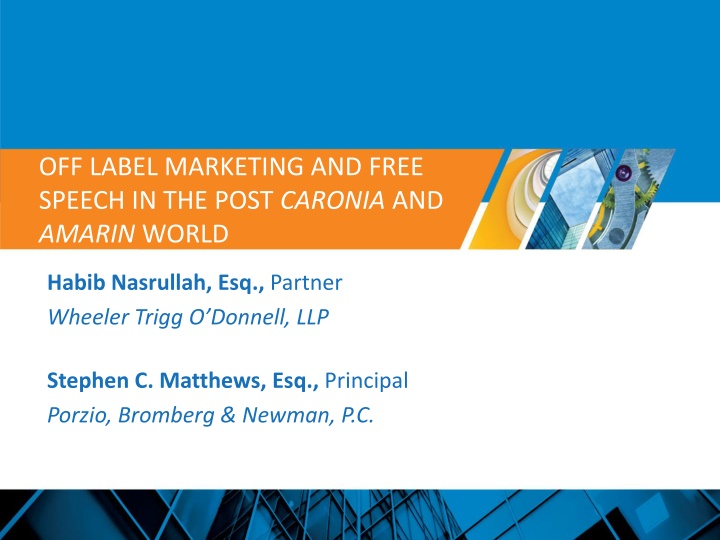


![Prevention and Combating of Hate Crimes and Hate Speech Bill [B.9B.2018]](/thumb/60513/prevention-and-combating-of-hate-crimes-and-hate-speech-bill-b-9b-2018.jpg)



